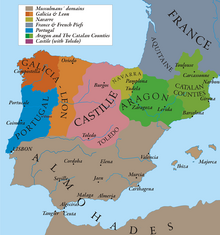m (→King of Navarre: date) Tag: sourceedit |
m (addenda) Tag: sourceedit |
||
| Line 1: | Line 1: | ||
{{NationInfo |
{{NationInfo |
||
| − | | name = Reino de Navarra <small>(Castilian)</small><br/> |
+ | | name = Reino de Navarra <small>(Navarro-Aragonese and Castilian)</small><br/> |
'''Nafarroako Erresuma''' <small>(Basque)</small><br/> |
'''Nafarroako Erresuma''' <small>(Basque)</small><br/> |
||
'''Regnum Navarrae''' <small>(Latin)</small><br/> |
'''Regnum Navarrae''' <small>(Latin)</small><br/> |
||
| Line 18: | Line 18: | ||
| motto_en = <!--English translation of the national motto.--> |
| motto_en = <!--English translation of the national motto.--> |
||
| Anthem = <!--National anthem.--> |
| Anthem = <!--National anthem.--> |
||
| − | | capital = Pamplona |
+ | | capital = Pamplona (Iruña) |
| city_largest = <!--Name of the most populated city (defaults to capital).--> |
| city_largest = <!--Name of the most populated city (defaults to capital).--> |
||
| city_other = Tudela |
| city_other = Tudela |
||
| − | | language = Navarro-Aragonese (administrative) |
+ | | language = Navarro-Aragonese (administrative) and French (Court) |
| − | | language_other = Basque (spoken), Latin (written), Occitan and |
+ | | language_other = Basque (spoken), Latin (written), Castilian, Occitan, Ladino and Mozarabic |
| religion = Roman Catholic |
| religion = Roman Catholic |
||
| − | | religion_other = |
+ | | religion_other = Jewish |
| ethnic_group = <!--Major ethnic groups of the nation.--> |
| ethnic_group = <!--Major ethnic groups of the nation.--> |
||
| ethnic_other = <!--Additional ethnic groups of the nation.--> |
| ethnic_other = <!--Additional ethnic groups of the nation.--> |
||
| Line 41: | Line 41: | ||
| ind_date = <!--Date at which independence was declared.--> |
| ind_date = <!--Date at which independence was declared.--> |
||
| ind_rec = <!--Date at which independence was recognized.--> |
| ind_rec = <!--Date at which independence was recognized.--> |
||
| − | | currency = |
+ | | currency =Dinero, vellón, óbolo, and maravedí |
| timezone = <!--Time zones of the nation.--> |
| timezone = <!--Time zones of the nation.--> |
||
| summer_time = <!--Summer time zones of the nation.--> |
| summer_time = <!--Summer time zones of the nation.--> |
||
| Line 66: | Line 66: | ||
* Teobaldo I of Navarre, and IV Count of Champagne (1201–1253) Reign 1234-1253 |
* Teobaldo I of Navarre, and IV Count of Champagne (1201–1253) Reign 1234-1253 |
||
* Teobaldo II of Navarre, and V Count of Champagne (1239–1270) Reign 1253-1270 |
* Teobaldo II of Navarre, and V Count of Champagne (1239–1270) Reign 1253-1270 |
||
| + | * Enrique I of Navarre, and II Count of Champagne (1244–...) Reign 1270-... |
||
| − | *... |
||
| + | |||
---- |
---- |
||
{{OfLionsAndFalcons}} |
{{OfLionsAndFalcons}} |
||
Revision as of 01:19, 11 October 2016
| |||||||
| Capital (and largest city) |
Pamplona (Iruña) | ||||||
| Other cities | Tudela | ||||||
| Language official |
Navarro-Aragonese (administrative) and French (Court) | ||||||
| others | Basque (spoken), Latin (written), Castilian, Occitan, Ladino and Mozarabic | ||||||
| Religion main |
Roman Catholic | ||||||
| others | Jewish | ||||||
| Demonym | Navarrese | ||||||
| Government | Feudal monarchy | ||||||
| Legislature | Cortes de Navarra | ||||||
| King | Teobaldo II of Navarre | ||||||
| Royal house: | House of Champagne | ||||||
| Established | 824 | ||||||
| Currency | Dinero, vellón, óbolo, and maravedí | ||||||
The Kingdom of Navarre, originally the Kingdom of Pamplona, is a Basque-based kingdom that occupied lands on either side of the western Pyrenees, alongside the Atlantic Ocean between Spain and France. It borders to the west the Kingdom of Castile and east Crown of Aragón, and northwest France.
History
Sancho VII
Sancho VII el Fuerte took part he took in the ill fated Battle of Las Navas de Tolosa (1212). Having lost the Christian Kingdoms, Sancho VII returned to Navarre.
Sancho VII's relations with the countries north of the Pyrenees were notably better than his Castilian ones. Several Pyreneean counties declared themselves his vassals and he concluded treaties with John, King of England, and Pedro II de Aragón. With the former he signed at Tudela, in 1231, a treaty stating that whoever survived the other would inherit unopposed the other's kingdom.
Sancho went into retirement at Tudela at some point, when his youngest sister Blanca came from Champagne and took administration of the kingdom until she died in 1229. His eldest sister, Berengaria, Queen of England, died in 1232, thus leaving Sancho alone among the children of Sancho VI. When he died in his castle at Tudela Blanca's son Theobald IV of Champagne was recognized as the next monarch of Navarre on April 1234 by the Cortes of Navarre.
Under the House of Champagne
Thus the Kingdom of Navarre, though the crown was still claimed by the kings of Aragon, passed by marriage to the House of Champagne, firstly to the heirs of Blanca, who were simultaneously counts of Champagne and Brie, with the support of the Navarrese Cortes. Also Blanche of Castile, regent to the future French king Louis IX, had interest in cutting down Pedro II's territorial expansions and its Navarrese link.
- ...
- Sancho VII el Fuerte (1154 – 1234) Reign 1194-1234.
- Teobaldo I of Navarre, and IV Count of Champagne (1201–1253) Reign 1234-1253
- Teobaldo II of Navarre, and V Count of Champagne (1239–1270) Reign 1253-1270
- Enrique I of Navarre, and II Count of Champagne (1244–...) Reign 1270-...
| ||||||||||||||||||||





